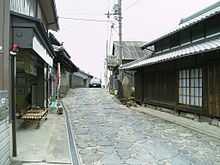Tōge
Tōge (峠) is a Japanese word literally meaning "pass". It refers to a mountain pass or any of the narrow, winding roads that can be found in and around the mountains of Japan and other geographically similar areas, like the legendary Nordschleife in Germany.

In order to decrease the incline of mountain roads, thereby making them easier for commercial trucks to pass, engineers place a series of S bends in steep roads that provide access to and from high mountain elevations. These passes have become popular with street racers and motorsport enthusiasts because they provide a challenging, albeit dangerous, course.
Racing
There are 3 main types of tōge battles:[citation needed]
Cat and mouse/sudden death

The cars start almost bumper to bumper (one in front of the other). The lead car wins if the space between the cars increases considerably, while the following car wins if it decreases the gap between the lead car. If any car spins out or crashes, the other car wins the race. In the event of the following car keeping pace, the race is usually rerun with the positions swapped.
This style of battle is often chosen when the road isn't wide enough to allow passing, but if the car in front does indeed somehow get passed, the overtaken car loses if he does not re-pass.
Grip Gambler
If the road is wide enough, this method comes into use. Instead of the lead and chase type of start, the cars are lined up next to each other. If there exists a power handicap, a rolling start would be employed up until the 1st turn. Whoever is in the lead at the end of the "tōge" road, is the winner. Then if the chaser manages to keep up they switch roles until someone wins.
Time attack/ghost battle
Ghost battles are challenges in racing. Opponents do not actually race at the same time, instead, they are timed separately over a particular length of road and the racer with the quickest time wins.
Spontaneous tōge battles may also be initiated by random encounters between racers on the street. The challenge is communicated through the use of the hazard lights, then, depending on the race setting, one of the first two tōge types is chosen for the battle.
Misconceptions
Stemming from this surge in popularity, the term has been pirated and misused by overzealous enthusiasts (often incorrectly as a verb) to erroneously describe almost any event involving street racing, even when there are no mountain passes involved.
Another common mistake is the association of drifting with tōge, implying at times that the words share the same definition. While drift is considered a style or form of driving, tōge does not necessarily have any binding relationship to motorsports. Drifting can be used on the tōge to prevent the chaser from following their proper line. For example if the lead car were to drift, it would eliminate about 60 percent of the chaser's possible lines forcing them to choose slower lines that cannot be predicted. Also in doing this one can cause the chaser to slow down in order not to crash into the drifting car in front, which might cause complications due to keeping rpm's high and traction and all other variables to consider in slowing down for a corner.
Tōge in Time trial format could be said to be a subset of Tarmac Rally. With the Rallye Monte Carlo and Tour de Corse demonstrating the parallel, separated only by cultural heritage.
Media
Tōge racing's notoriety outside of Japan may be largely attributed to entertainment media such as Ridge Racer (The name Ridge Racer can be roughly translated to Japanese as Touge no Hashiriya) and Initial D (originally manga, and later anime, and in 2005, live action under the title Chinese: 頭文字 D; pinyin: Tou Wen Zi D).
Race Driver: Grid also features Tōge. There is 'Touge' which is an event in which the driver must race twice, once up and once down the mountain, and there is also "Midnight Touge," which takes place during the night and only features one race, either up or down the mountain.
Best Motoring International first featured the Touge Showdown in Best Motoring International Vol.2 New M3 Takes on JDM Super Sports released in 2001. This is arguably the first time the word touge was used in US media and not translated as "mountain pass" or another other English word.
|